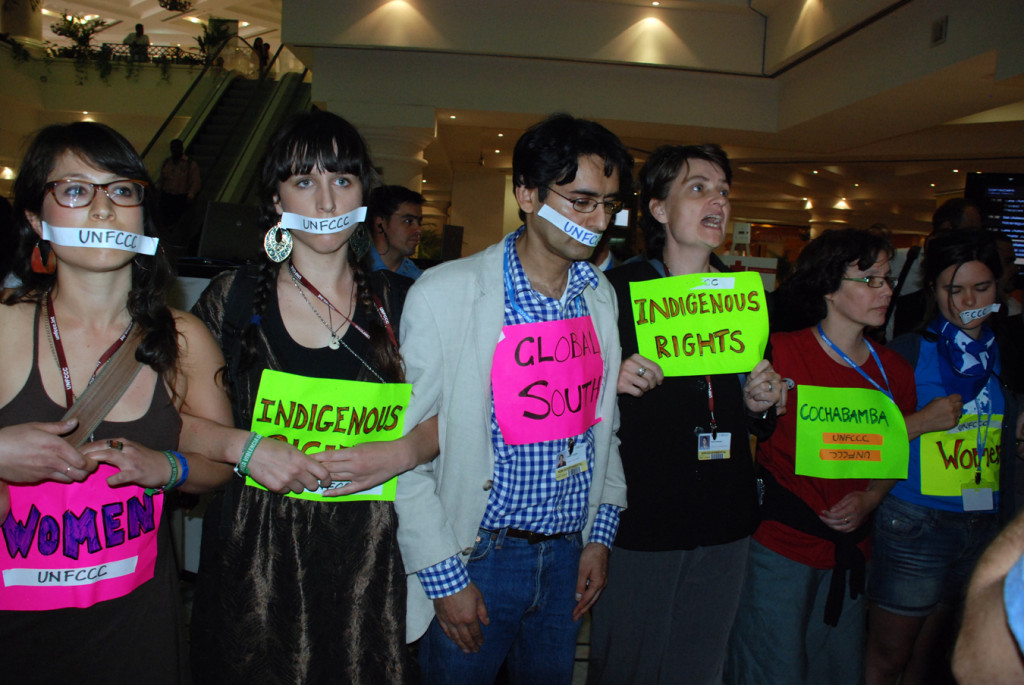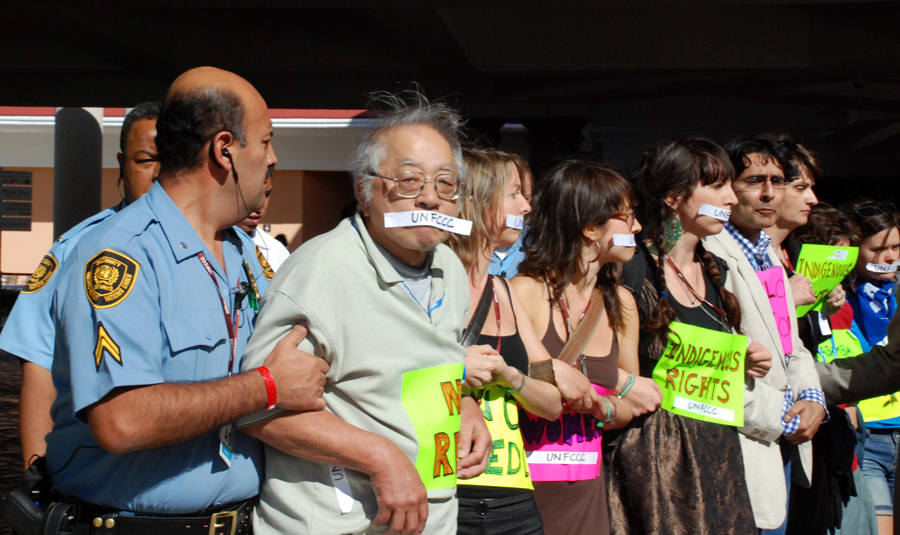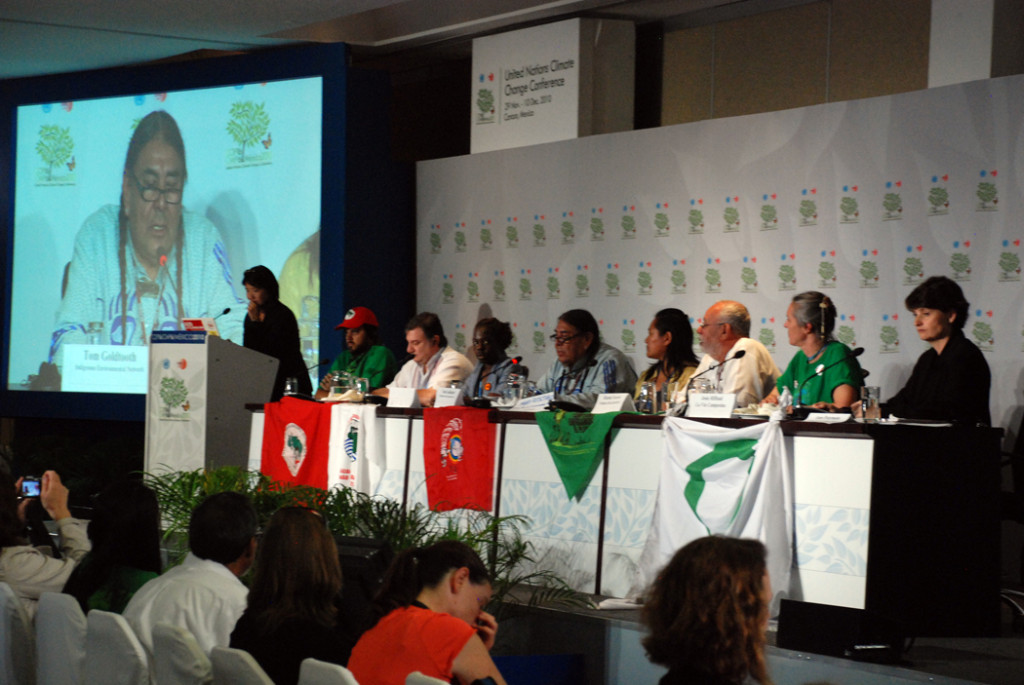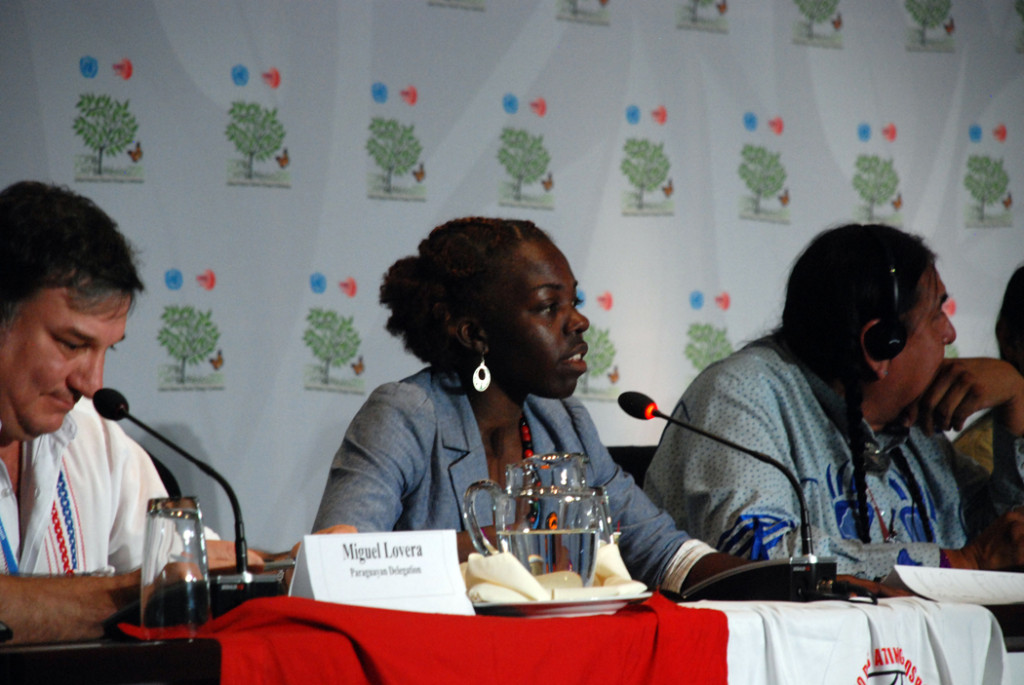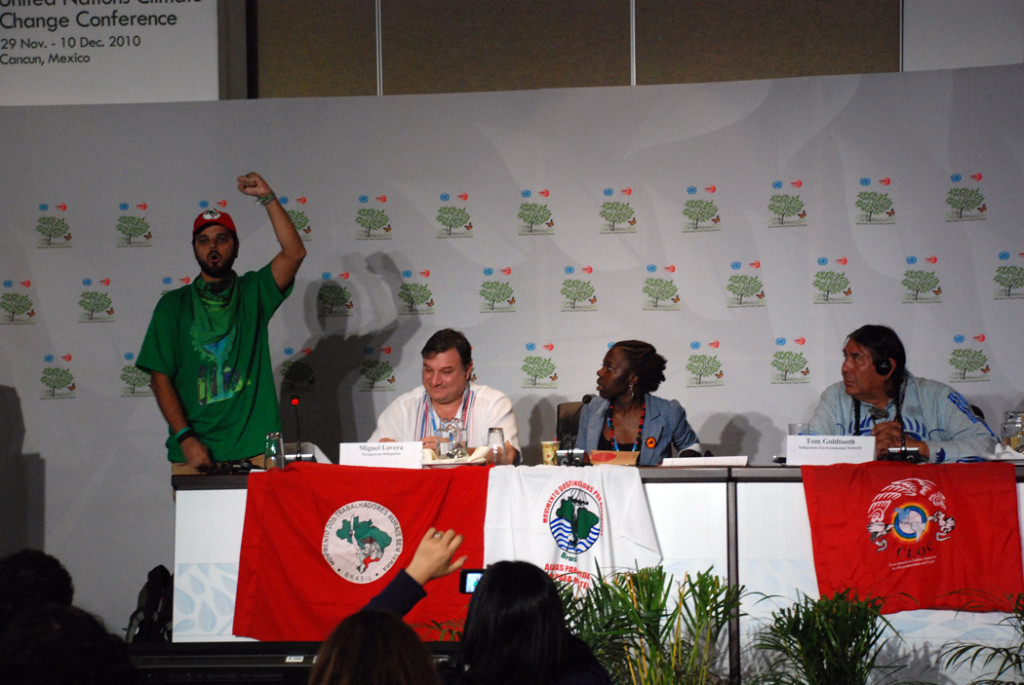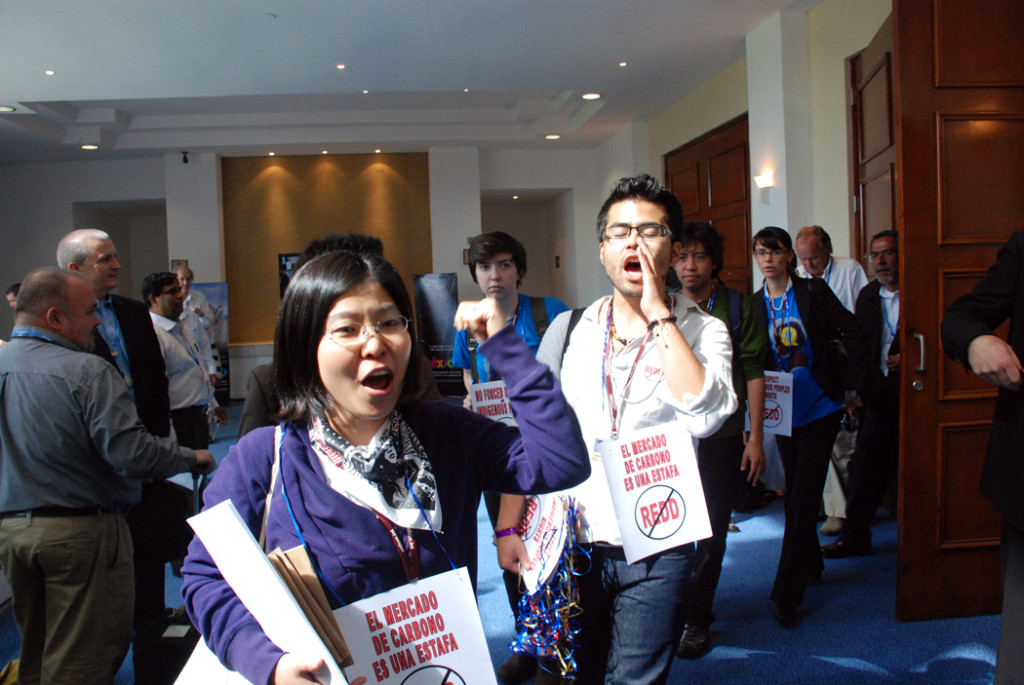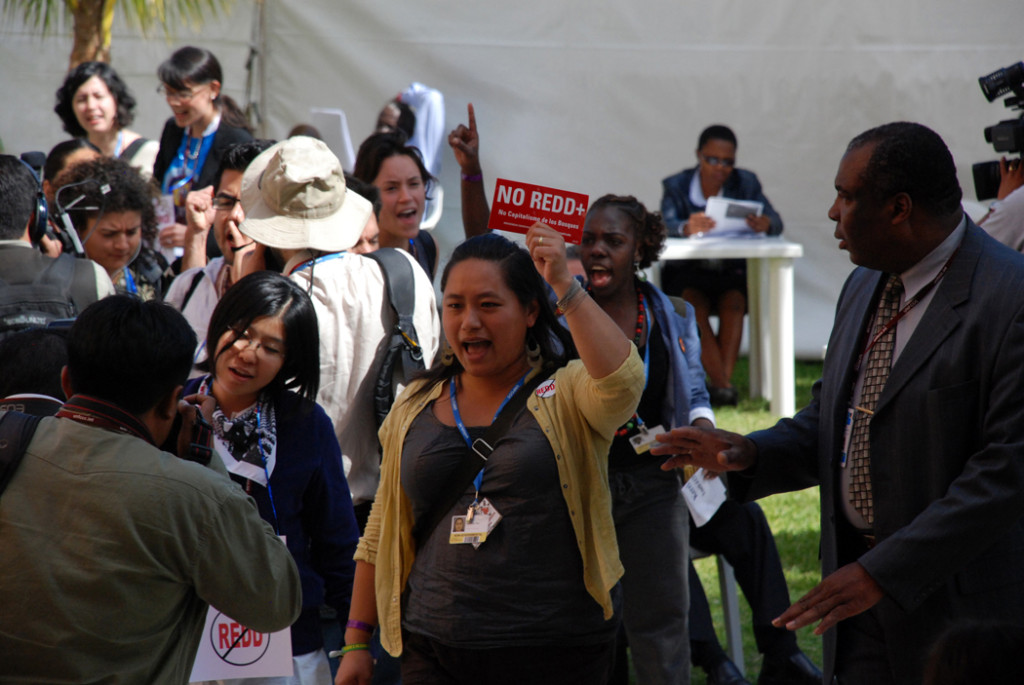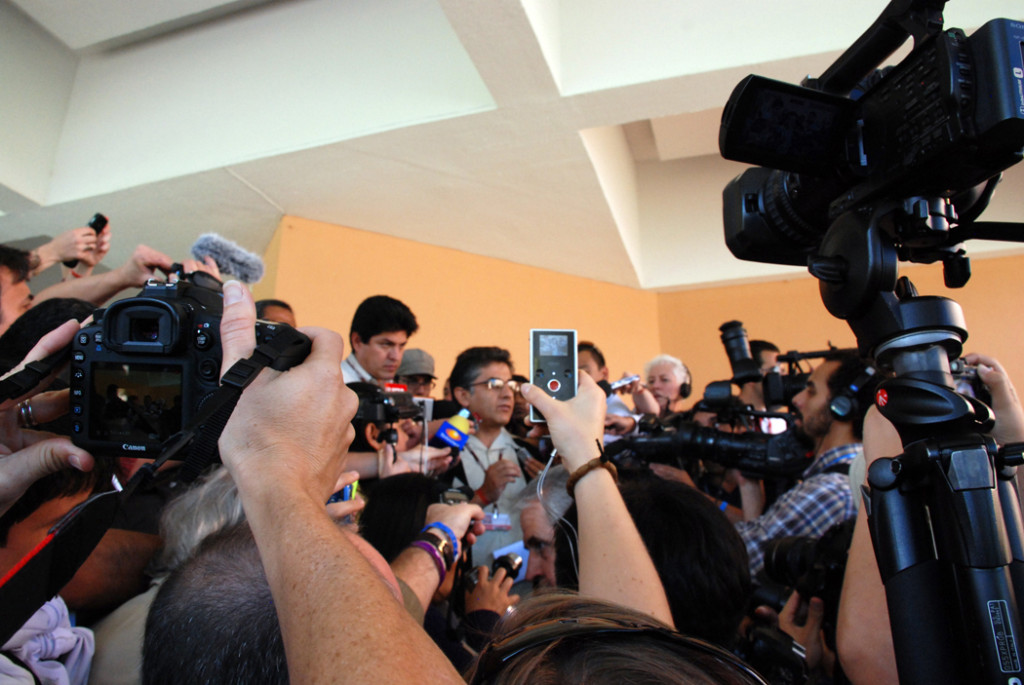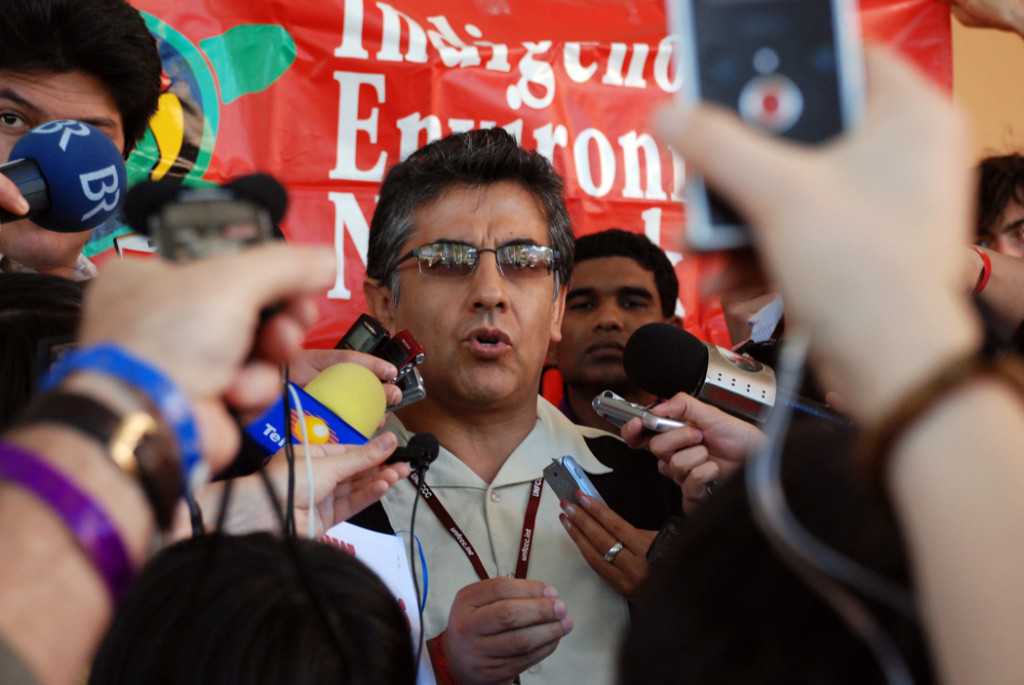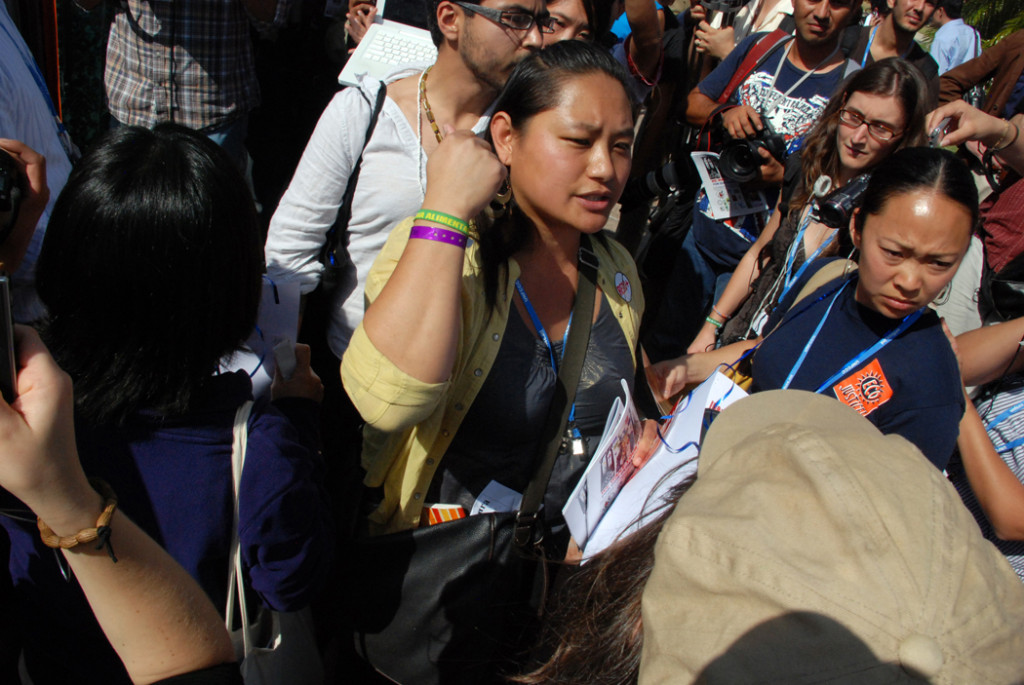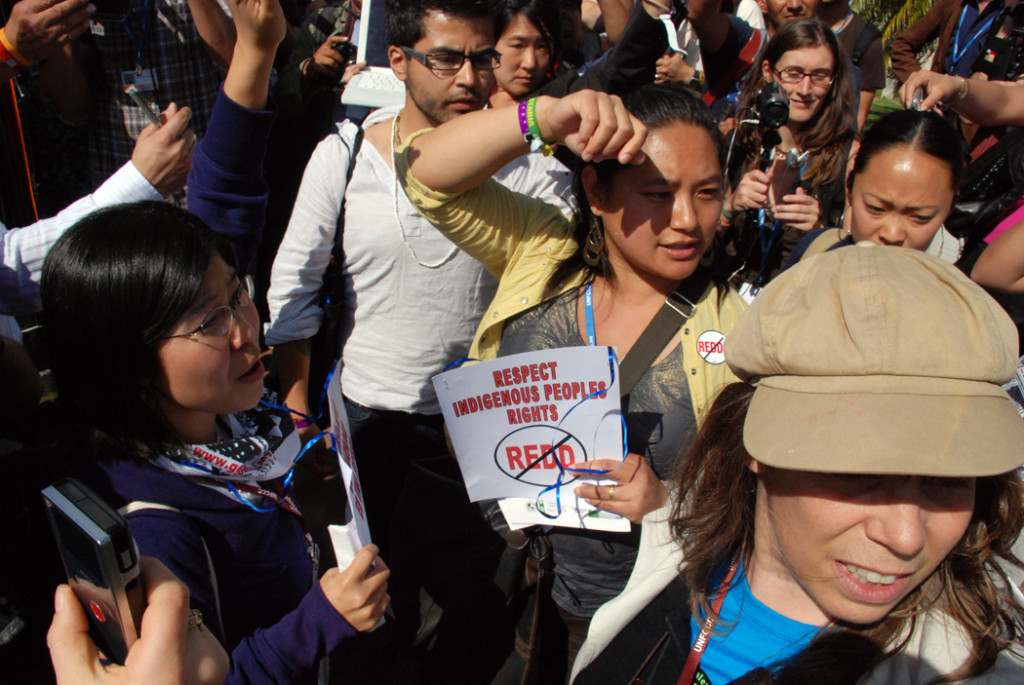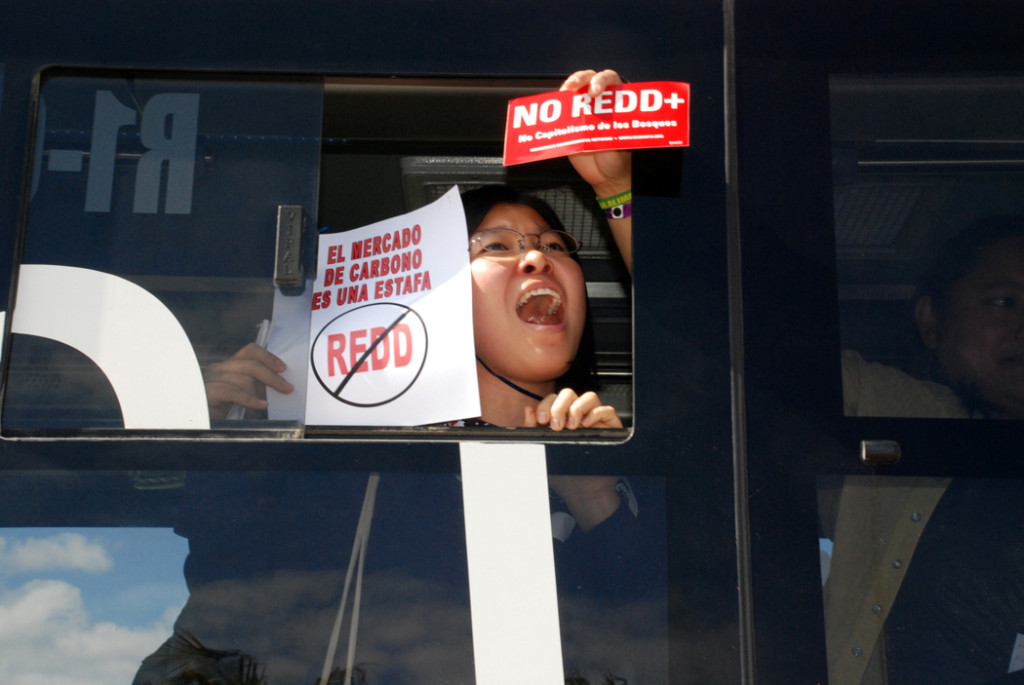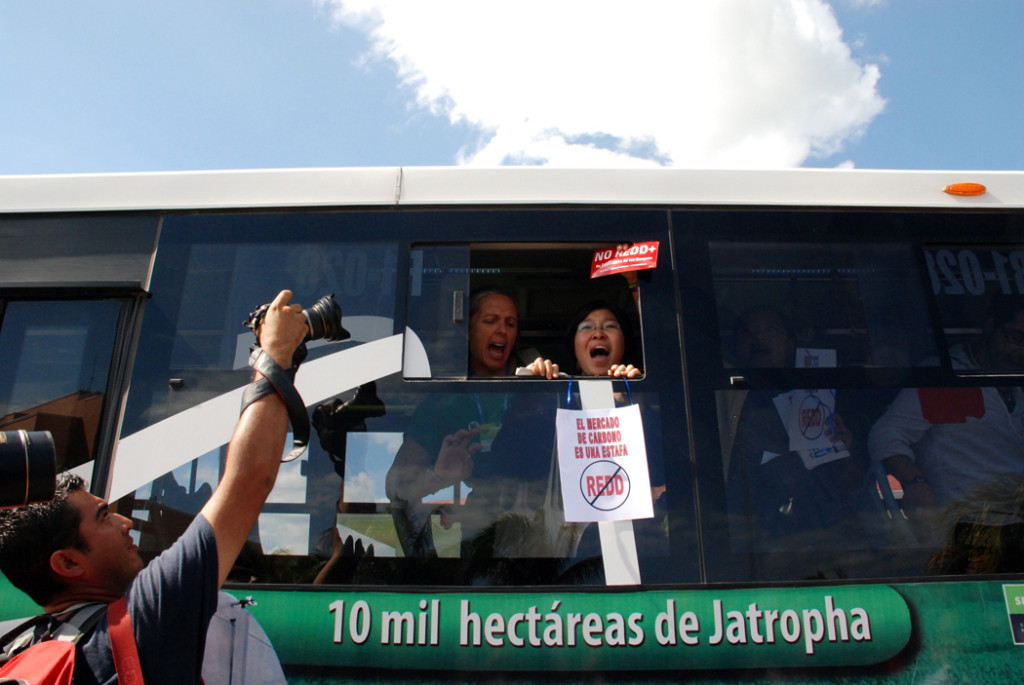By Anne Petermann, Global Justice Ecology Project Executive Director

Mexican RoboCop Poses for Photos in Cancun. Photo: Langelle/GJEP-GFC
Global Justice Ecology Project Co-Director/strategist Orin Langelle (on assignment for Z Magazine) and I arrived in Cancun for the UN Climate Conference the day after U.S. Thanksgiving to a hotel infested with Mexican federales. “You’ve GOT to be kidding me,” was our immediate reaction. We dodged their chaotically parked armored vehicles and jeeps to enter the hotel, where we found hoardes of uniformed officers armed with automatic weapons everywhere we went. The breakfast room, the poolside, the beach, the bar. Walking out of our room (which was surrounded on both sides federales) I literally bumped into one.
Most of them were mere youths who, judging by the way they carelessly swung their weapons around, had not had sufficient gun safety courses… Orin nearly collided with the barrel of one at breakfast one morning—its owner had it lying casually across his lap as he ate as though the deadly weapon was a sleeping cat. When we were walking around that first day, we happened upon the bizarre scene above. A photo shoot of fully armed robocops posing in front of a giant fake Christmas tree.
Absurd? Yes. But not nearly as absurd as the events that unfolded at the Moon Palace—home to the UN Climate Conference (COP16)—over the next two weeks.
Once upon a time at these climate talks, organizations and Indigenous peoples’ groups roamed freely. They could wander around at will—even into the plenary, where the high level ministers were negotiating the fate of the planet. No more. The open range is now fenced off. What precipitated such a radical change? The overreaction of those in power to that strange and wondrous thing known as protest.

Reclaim Power March in Copenhagen. Photo: Langelle/GJEP-GFC
The UN Climate Secretariat and their security enforcers view protest as a bull views a red cape. They go blind with rage, lashing out at whomever is in their line of sight. When hundreds of non-governmental organizations (NGOs), Indigenous peoples and Party delegates marched out of the UN Climate Conference at the Bella Center in Copenhagen in December 2009, the Secretariat responded by stripping every participant of their right to participate in the talks. But before the protest even started, entire delegations of Friends of the Earth and other groups that had committed the sin of unpermitted symbolic protest earlier in the conference were barred outright from entering the Bella Center.
Since then, the UN Climate Secretariat has been scheming and conniving how to control these rogue factions and cut off any protest before it can begin. At the interim UN climate meeting in Bonn that I attended last May, they had a special meeting to discuss “observer” participation in the climate COPs. As a spectacular indication of the absurdity to come, when Friends of the Earth prepared an intervention (a short statement) for this meeting to emphasize the importance of observer participation to the UN Climate Conferences, they were prohibited from reading it…
So in Cancun, the UN Climate Secretariat contrived an elaborate set of demobilization tactics to curtail any potentially unruliness. In addition to the highly visible force of federales, they devised a complex obstacle course for conference participants.
Anyone not rich enough to stay on the luxurious, exclusive grounds of the Moon Palace resort and (highly toxic) golf course—in other words, developing country parties, most NGOs, Indigenous Peoples and social movements—was treated to a daily bus ride from their hotel to the Cancun Messe (no, seriously, that’s what they called it) that lasted anywhere from 45 minutes to 2 hours, depending on how badly the federales had bottlenecked the highway. Once in the Messe, we had to go through a security check point and a metal detector, pass through a building and emerge from the other side to wait for a second bus (bus #9) to take us on another 20-25 minute ride to the Moon Palace. Then in the evening, the process was reversed.
The Moon Palace itself was split into three sections—the Maya building, which housed the plenary session and the actual negotiations, the Azteca Building, where those not permitted into the negotiations (that is, most of the NGOs, IPOs and all of the media) were allowed to use computers and watch the proceedings on a big screen.
The media were given their very own building—the Nizuk building, which was yet another 10 minute ride from Maya and Azteca. As you might imagine, it was virtually empty, as most of the media based themselves out of the Azteca to be closer to the action.
I had the pleasure of being a guest on Democracy Now! on the morning of December 9th, which meant finding my way to Nizuk, where the show was filmed live daily at 7am. I left my hotel at 5:15am to catch a 400 peso cab to the Cancun Messe (no cabs allowed to go to the Moon Palace), then catch a bus to Nizuk. I got there with 20 minutes to spare.
Democracy Now! and the other live broadcasts (their neighbor was Associated Press and around the corner was Al Jazeera) were filmed outside on the balcony. While Amy Goodman interviewed me, her hair whipped in the gusty breeze. A loud generator hummed nearby. I wondered what they would do if they got a big rainstorm. (By the way, if you’d like to watch that interview, which was all about REDD [the Reducing Emissions from Deforestation and Forest Degradation scheme], click here)
But all of this nonsense was a mere inkling of what was to come. One of the first real tests of the Secretariat’s demobilization strategy came on Tuesday December 7th, when Global Justice Ecology Project hosted a press conference that turned into a spontaneous march. Our press conference was scheduled on the day that La Via Campesina (LVC) had called for the “1,000 Cancuns” global actions on climate, one of which was to be a mass march in Cancun itself. The press conference morphed into another “1,000 Cancuns” protest inside the very walls of the Moon Palace.
GJEP had made the decision to turn the press conference over to LVC, the Indigenous Environmental Network and youth so they could explain the “1,000 Cancuns” actions in the context of the silencing of voices occurring in the Moon Palace. UN Delegates from Paraguay and Nicaragua also participated to express their solidarity with the day of action. I moderated the press conference and introduced it by invoking the name of Lee Kung Hae, the South Korean farmer and La Via Campesina member who had martyred himself by plunging a knife into his heart atop the barricades in Cancun at Kilometer Zero during the protests against the World Trade Organization in 2003. At that time, it was the global justice movement. Now it is the climate justice movement. But really it is the same—the people rising up against the neoliberal oligarchy: i.e. the elite corporados bent on ruling the world and running it into the ground.

Mass action against the WTO in Cancun in 2003. Photo: Langelle/GJEP
Back in 2003, Robert Zoellick was the U.S. Trade Representative who tried to force bad trade policies down the throats of so-called “developing countries” during the meetings of the World Trade Organization. Today he is the President of the World Bank, and is trying to force bad climate policies down the throats of the developing world under the umbrella of the UNFCCC, aka the World Carbon Trade Organization.
Writing this blog post from San Cristobal de las Casas, in the Mexican state of Chiapas brings to mind one of the most hopeful attacks on this neoliberal paradigm—the uprising of the Zapatista Army of National Liberation (EZLN) on January 1, 1994—the day the North American Free Trade Agreement (NAFTA) went into effect. The Zapatistas took up arms against NAFTA saying it would be a “death sentence” to the Indigenous peoples of Mexico. Indeed, in order to be accepted into NAFTA, Mexico had to re-write Article 27 of the Mexican Constitution. Article 27 was implemented to protect Mexican communal lands and came out of the Mexican Revolution led by Emiliano Zapata in the early 1900s. But communal lands and free trade do not mix. Edward Krobaker, Vice President of International Paper, re-wrote Article 27 to make it favorable to the timber barons. Then it was NAFTA, today it is REDD—but the point is the same—it’s all about who controls the land. The Zapatista struggle was and is for autonomy, which has been an objective of Indigenous communities for centuries.
But I digress. Back to the press conference. Pablo Solon, Bolivia’s charismatic Ambassador to the UN was supposed to be one of the speakers at the press conference but got tied up and could not get there. Activists from Youth 4 Climate Justice requested to speak after yet again being denied an official permit to protest, and later turned the press conference into a spontaneous march. If they would not be given permission to protest then they would do so without. Democracy is a messy thing.

Tom Goldtooth of IEN Speaks to the Media. Photo: Langelle/GJEP-GFC
The youth delegates marched out the press conference room chanting “No REDD, no REDD!” The rest of us joined them but stopped on the front steps of the building when Pablo Solon suddenly joined the group. In the midst of a media feeding frenzy, he proclaimed Bolivia’s solidarity with the LVC march happening in the streets. Behind him people held banners from the press conference. Following Solon’s speech, Tom Goldtooth, the high-profile Executive Director of the Indigenous Environmental Network, and one of the most vocal Indigenous opponents to the highly controversial REDD scheme, spoke passionately to the crowd. When he was done, the youth delegates resumed their chanting and marched toward the Maya building where the negotiations were occurring.
Then UN security moved in. They had to contain this anarchic outbreak before it spread through the halls and infected the delegates. The three youths, deemed to be the leaders of the unrest, had their badges confiscated and were loaded onto a security bus to be removed from the premises. Other observers, not understanding the nature of this bus (it looking like all of the other buses), got on believing it would take them back to the Messe where they could then take yet another bus to join the LVC march. This included three people accredited to participate by Global Justice Ecology Project. They were removed from the UN grounds and dropped off.
The UN also stripped Tom Goldtooth of his accreditation badge for the terrible crime of giving a powerful interview to a hungry media. Another of our delegates was de-badged for filming and live-streaming video of the spontaneous protest onto the web. Another lost his badge merely for getting on the wrong bus. Others for the outrageous act of holding up banners.
We did not learn that Tom and others had been banned from the conference until the next morning, when they attempted to enter and the security screen beeped and flashed red. Alarmed and outraged, representatives from Friends of the Earth International, the Institute for Policy Studies, and I took the bus over to the Moon Palace to meet with NGO liaisons Warren and Magoumi.
The encounter was immensely frustrating. We staunchly defended Tom Goldtooth and his right to speak publicly to the media. We also defended the right of our delegate to film the protest. I also spoke up in defense of the three de-badged youth leaders, explaining that this was their first Climate Conference and they should have been given a warning (as was the norm in Copenhagen) that if they continued the protest, they would lose their accreditation. In one ear and out the other… Magoumi responded that the youth’s delegation leader should have informed them of the rules, and besides, she pointed out, if someone was committed murder, would they get a warning that if they did it again they would get arrested? (Really… that was her response!) Our retort that chanting and marching could hardly be equated with murder was waved off by Magoumi as though we were a swarm of gnats.
In the end, Tom got his badge back after pressure was put on the UNFCCC by country delegations. But he lost one whole day of access to the talks. Several of the other delegates never got their badges back. Security had deemed them “part of the protest,” and there was no opportunity for appeal.
For GJEP, the repressive actions of the Climate COP had to be answered with action. We were prepared to put our organizational accreditation on the line. Someone had to stand up for the right of people to participate in decisions regarding their future.

Occupation of the Moon Palace. Photo: Langelle/GJEP-GFC
Six of our delegation (including our Board member Hiroshi) were joined by four more youth delegates plus representatives from Focus on the Global South and BiofuelWatch to occupy the lobby of the Maya building. We locked arms in a line, blocking access to the negotiating rooms. All but three of us wore gags that read “UNFCCC”. Those of us without gags shouted slogans such as, “The UN is silencing Indigenous Peoples!” and “The UN is silencing the voices of youth!”—in both English and Spanish.
Warren and Magoumi were on the scene in a flash and I heard them directly behind me trying to get me to turn my attention to them. Magoumi was tapping my shoulder while robotically saying over and over, “Anna…Anna…Anna…Anna…is this you ignoring me Anna? Anna…Anna…” (not sure why she insisted on pronouncing the silent “e” in my name.) When I continued yelling slogans, she changed tactics and walked directly in front of me. “Anna, come on, let’s take this outside. We have a place where you can do this all day long if you want to. Anna…Anna…Anna…” I have to admit to being slightly rattled by having to do my shouting directly over Magoumi’s head, but fortunately, she is quite short.

GJEP Board Member Hiroshi Kanno is Manhandled by UN Security During GJEP's Occupation of the Moon Palace. Photo: Langelle/GJEP-GFC
The scene had become another feast for the media, but after about 10 minutes, I could sense them tiring of the same old shots, so it was time to move. As soon as we made a motion toward the door (arms still locked), security was on us in a flash and used pain compliance tactics on the two people who bookended our interlocked line—including our 73 year old Board member Hiroshi. Surprise surprise, once we got outside we were not escorted to their designated “protest pit” where permitted protests were allowed to occur, as Magoumi had promised, but rather forced onto a waiting bus and hustled off the premises. Jazzed with adrenaline, we all felt pretty damned good about what we had just done and the coverage we got—even when the UN security guard on the bus pointed out that if we had done that protest in Germany we would have been arrested. “You’re lucky this is Mexico,” he sneered. Indeed I have been threatened with arrest by German police for holding up paper signs protesting genetically engineered trees outside of a UN Convention on Biological Diversity meeting in Bonn. German police have even less sense of humor than UN security. None-the-less, those of us on the bus felt elated for taking action—for standing up for the voices of the voiceless.
You can view Orin’s photo essay from the Moon Palace Occupation by clicking here
Democracy Now! covered the silencing of voices at the Climate Conference in a feature that included our action and a youth action that followed later in the day. During the latter, the media nearly rioted when a Reuters photographer was grabbed and beaten by UN security on one of the buses. DN! ran the feature on Monday, December 13th following the end of the talks. You can watch that coverage here
I have not yet heard from Magoumi or Warren if Global Justice Ecology Project has lost its accreditation to participate in future UN Climate COPs. Or if any of us will be allowed to enter its premises in the future. But those conferences are such energy-sucking, mind-numbing, frustrating clusterf#*ks that if we are not allowed back in, I can’t say I will have any regrets.
Next year’s climate COP will take place in Durban, South Africa, where the UN will face off with the social movements who, against all odds, brought down Apartheid.
Now THAT will be something…

African Country Delegates Protest Unjust Climate Policies in Copenhagen in December 2009. Photo: Langelle/GJEP-GFC
Signing off from San Cristobal de las Casas, near Zapatista rebel held territory in Chiapas, Mexico.










